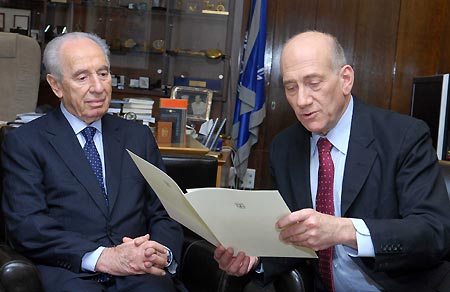 |
|
Israeli Prime Minister Ehud Olmert hands in the resignation letter to President Shimon Peres at the latter's residence in Jerusalem September 21, 2008. Olmert on Sunday announced his decision to resign and formally submited the resignation letter to President Shimon Peres. [Xinhua]
|
Israel's Ehud Olmert on Sunday evening submitted his resignation letter to President Shimon Peres, formally stepping down from the premiership.
The outgoing prime minister visited the mainly ceremonial president at the presidential residence in Jerusalem, where he handed in his resignation letter after 33 months in the Prime Minister's Office.
"This evening, Prime Minister Ehud Olmert submitted a letter of resignation from his post. This is not an easy decision, and I am convinced that this is a difficult evening for him," Peres said upon receiving the letter, adding that "I appreciate the respectful way in which he is handing over his power."
The political veteran thanked Olmert for his service as Mayor of Jerusalem, as Minister of Industry, Trade and Labor, and as Prime Minister, saying that "the safety of the state of Israel and the welfare of its citizens were central to his actions as Prime Minister."
Olmert ascended to the national and party leadership after Kadima party's founder, former Prime Minister Ariel Sharon suffered a severe hemorrhagic stroke in early 2006. Yet dogged by a series of police probes against him, including corruption and fraud allegations, a worn-looking Olmert announced on July 30 that he would resign upon the election of a new Kadima leader.
Last week, the three-year-old centrist party held its first-ever primary, which saw current Foreign Minister Tzipi Livni win with a slim margin and become its third and first woman leader. Earlier on Sunday, he told his cabinet that he would resign as he promised.
Following his resignation, Olmert will remain in power as caretaker prime minister, with his government as a caretaker government, till the formation of a new government.
The probes-plagued premier also said he would resign if indicted. Israeli police has recommended the state prosecution to indict Olmert, yet the prosecution has not yet made its decision.
Olmert's spokesman Mark Regev told reporters on Sunday that even if Olmert would be indicted during the interim period, he would not resign again.